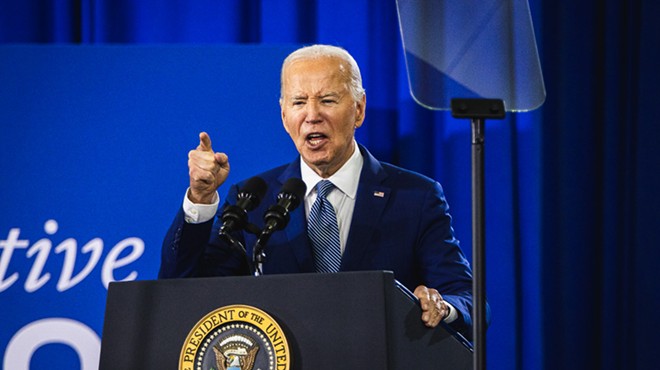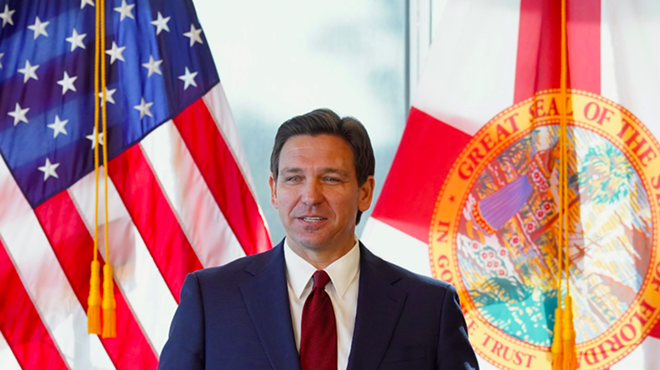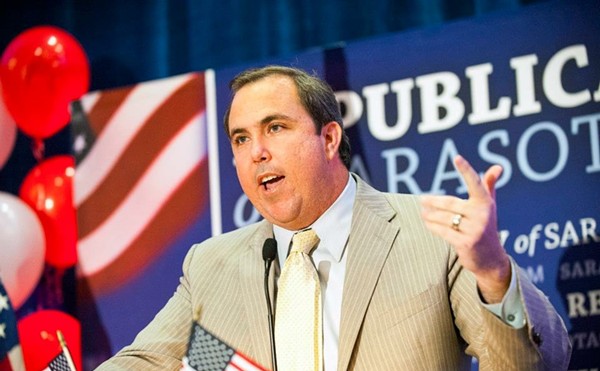A local public relations firm that was paid to help kill off support for a local rent control ballot measure in Orange County in 2022 is now spearheading an effort to oppose a statewide ballot measure that aims to legalize recreational marijuana use.
According to a news release, the “Vote No on 3” opposition campaign — targeting Florida’s Amendment 3 — is being led by Consensus Communications, an Orlando-based consulting company of “storytellers” that, according to campaign finance records, previously worked with industry trade groups to gut support for a modest rent stabilization initiative in Orange County last election cycle.
The new campaign, targeting recreational pot this time, describes itself on its website as a “coalition” that is “made up of parents, teachers, law enforcement officials and first responders, faith leaders, and members of the business community committed to preserving Florida’s public health and safety by opposing Amendment 3.”
Florida’s Amendment 3, spearheaded by the group Smart & Safe Florida, would legalize non-medical marijuana use, if approved by at least 60 percent of Florida voters, and would remove criminal or civil penalties for adults over 21 who possess and use up to three ounces of marijuana. It would also allow medical marijuana treatment centers, and other state licensed entities, to “acquire, cultivate, process, manufacture, sell, and distribute such products and accessories,” according to a ballot summary.
Consensus Communications, an agency that has also received public money through contracts with the Greater Orlando Aviation Authority, shared that their firm has won 19 of the ballot initiative campaigns they’ve worked on, although it’s unclear if the Orange County example — ultimately gutted due to a lawsuit, not a lack of public support — is one of them. Only 13 of their ballot initiative projects are listed on their website, with their last example dating back to 2014.
As investigative reporter Jason Garcia first reported in his independent Substack publication Seeking Rents, a coalition of apartment developers, realtors and landlord lobbying groups waged a $2 million campaign against the 2022 rent stabilization initiative in Orange County, which sought to cap rent increases at no more than 9.8 percent for just one year. The goal was to offer a temporary stopgap to help address massive rent hikes reported by residents who were struggling to afford to continue living in their own communities.
State campaign finance records show the coalition funneled funds through the Realtors Issues Mobilization Committee, affiliated with the Florida Realtors Association, and Floridians for Housing Opportunity, a committee chaired by former Florida Apartment Association president Bonnie Smeltzer.
The latter forked over about $33,000 to Consensus Communications, specifically, for advertising and campaign consulting services, according to records. Ahead of the election, Consensus also publicly touted an op-ed published in the Orlando Sentinel, penned by representatives of their “client”: Monica Ramsey, executive vice president of the Apartment Association of Orlando, and Chip Tatum, executive VP of the Florida Apartment Association.
The pair, in their opinion article, described the rent control initiative as a “draconian” measure and “poison pill.” “Every minute wasted on rent control is one less minute that could have been invested in real solutions,” they wrote, pointing to new housing construction as a dire need for the community — one that county leaders themselves did not and have not disputed.
Altogether, both political committees spent more than $2.1 million on advertising and media production for their anti-rent control campaign, which ultimately failed to persuade the 59 percent of Orange County residents who voted in favor of the rental cap. The same lobbying groups who opposed the initiative, however, even further upped their game less than a year later, by backing a statewide law — approved by lawmakers — that prohibits local communities from trying to control rents again.
Political consultant Sarah Bascom, who is serving as spokesperson for the new “Vote No on 3” campaign targeting marijuana use, said they plan to raise money for their anti-pot campaign through Keep Florida Clean, a newly created political committee that is chaired by James Uthmeier. Uthmeier, who serves as chief of staff for Florida Gov. Ron DeSantis, plans to serve on the board of the Vote No on 3 committee in a “personal capacity,” according to a press release, although the committee declares that their campaign has the “full support of the Governor.”
DeSantis, who is worried that Florida “will start to smell like marijuana” if the ballot measure passes, has already launched his own Florida Freedom Fund committee — also chaired by Uthmeier — that will aim to defeat Amendment 3 this November, as well as an abortion rights measure that will appear on the ballot as Amendment 4.
As the Tampa Bay Times reported, the leaders of the anti-pot campaign include several DeSantis allies, including Tre’ Evers (a political consultant for Consensus Communications who was on the board of the super PAC that supported DeSantis’ failed presidential campaign) and Ryan Tyson, who has also advised on DeSantis’ political campaigns.
Vote No on 3 argues that allowing non-medical marijuana use would cause the illicit drug market to “explode” and would make pot more prevalent and “more accessible” for children. Smart and Safe Florida, a group spearheading Amendment 3 that is largely funded by the cannabis industry, has sought to debunk such arguments through a Myths vs. Facts page on their website.
Recent studies published in JAMA, a journal associated with the American Medical Association, have found that legalizing marijuana use has not led to an increase in use by youth. In fact, a major study published in April, examining drug use patterns by 900,000 high school students from 2011 to 2021, found that fewer students self-reported using weed in the previous month in states where it had been legalized. This is reflected in new data reported out of Colorado, the first state in the country to legalize marijuana use for adults, which shows that marijuana use among youth has declined in the past decade that adult use has been permitted.
While marijuana remains illegal at the federal level, two dozen states have independently legalized recreational use, and the U.S. Drug Enforcement Administration is moving forward with a proposal to soften federal regulations. The proposal currently suggests downgrading the drug’s status as a Schedule I drug — classified as a drug with “no currently accepted medical use and a high potential for abuse” — to a Schedule III drug, classified as having a low potential for abuse and low risk for dependence.
Polling suggests that Amendment 3 is popular among Florida voters (and Orlando attorney John “Pot Daddy” Morgan), with 64 percent of 1,065 likely voters sharing in a recent poll that they would vote in favor of the initiative. It's also garnered the support the Libertarian Party of Florida, Gadsen County Sheriff Morris A. Young, and a coalition of veterans.
There are 24 states currently that have legalized recreational cannabis, but as the Florida Phoenix reported, only three out of 15 states that have approved it through a ballot measure saw more than 60 percent of voters in support. Unlike most states in the U.S. that require just 50 percent of voter support for ballot measures to pass, Florida requires such measures to receive at least 60 percent voter approval — and some Republicans have tried in the past to increase that to a supermajority threshold. So far, such efforts have been unsuccessful.
Subscribe to Orlando Weekly newsletters.
Follow us: Apple News | Google News | NewsBreak | Reddit | Instagram | Facebook | Twitter | or sign up for our RSS Feed




















